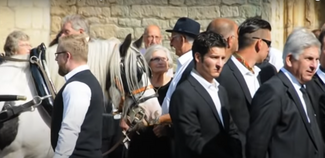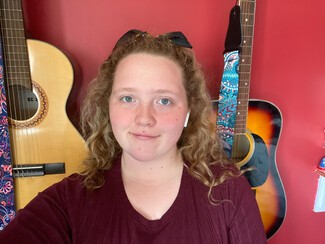‘My Grandfather’s coffin came home to our house’: Gypsy and Traveller funerals

Travellers’ Times reporter Ruby-Leigh Smith, a Romany Gypsy herself, explores how Gypsies and Traveller mourn lost loved ones – and the effects of coronavirus and discrimination on traditional funerals
When my grandfather, who I was very close to, died, I was ten. I remember that his coffin came home to our house three days before the funeral for the wake. We ‘sat up’ with him. This is an old fashioned tradition where we bring our loved ones home and we see them through the night, it is customary for the men to sit outside around a fire, and the women to sit in the trailers or separate. We gather like this so we can remember our loved one, and be there for the family, to comfort them. I remember being grateful that family and friends of my Grandad made time to come and sit with us. I remember them laughing and reminiscing about my Grandad.
For Gypsies and Travellers, having a funeral is the final part of saying goodbye to somebody that they have loved. A funeral is the last thing that we can do for our loved ones, and the last time that we can show them how much they meant to us. We will often travel the length of the country to attend a funeral, and sometimes to be with the person before they die. Traditionally we would have big funerals attended by hundreds of families and friends to pay respects - but with the current and ongoing coronavirus pandemic, that is no longer possible.
Watch: The funeral of Mrs Levi Boswell, Farnborough, Kent, 1933:
Death and grief is hard for everyone, but for Gypsies, Roma and Travellers this can be even harder. Dr Carol Rogers wrote in her thesis: “Who we are shapes how we grieve, for Gypsies and Travellers this means living with frequent and multiple intergenerational bereavement experiences which can result in complicated and prolonged grief reactions with long term implications for mental health.”
We as a community are thought to experience high levels of complex grief, and often at a younger age. This is believed to be for many reasons though there has been a specificity placed on generations of families living together. We have higher levels of suicide, tend to die younger, and have higher rates of pregnancy and infant mortality.
Again from Dr Carol Rogers: “The close-knit nature of Gypsy and Traveller communities means that the death of a relative is felt with great intensity, articulated by some research participants as an event that they ‘never come to terms with’. Consequently, complex family relationships and stoic attitudes result in personal grief responses often becoming hidden losses as highly protective behaviours place the needs of others above that of the individual; with family becoming a barrier rather than support mechanism following bereavement.”
Watch: The funeral of Simon Doherty, father of Paddy Doherty, Ashtead, Surrey, April 17th, 2017 – from Gypsy Kids; Our Secret World, Channel 5:
Funeral tributes and wreaths are very important to Gypsies, Roma and Travellers. Often there are large processions with dozens of wagons, carts, cars, trucks full of flowers and large, extravagant personalised tributes depicting their loved ones’ hobbies and interests. These offer some comfort to the families and are a token of their love and affection for the person who has passed away.
However, there are some churches and cemeteries which make this difficult time even harder for Gypsy, Roma and Traveller families. The Travellers' Times have received reports from community members across the UK telling us of often blatant discrimination, making a difficult time ever harder. For example, a Romany Gypsy woman told us of a church in Essex ordering the family to remove some of the floral tributes from the church land for being ‘gaudy’ and ‘Traveller-ish’. This is nothing more than thinly veiled prejudice.

At Hatfield Lawn cemetery in Hertfordshire, we have had multiple reports of discriminatory and upsetting treatment of relatives. We have heard that they have had to hold funerals in virtual darkness at 7am before the cemetery is open, tributes removed from graves, having to sign contracts and paying inflated fees to councils. Even when churches step up and try to support families, local councils are still making things difficult.
Funerals during the coronavirus pandemic are difficult for everyone, not just Travellers. We are not going to ignore rules as a mass; we have relatives we are still trying to protect and yet local churches, cemeteries and councils presume and are placing further pressure on families.
By Ruby-Leigh Smith
(Lead photograph: Mourners at the funeral of Gordon Boswell in Spalding,13th September, 2016 taken from a video by Tim Wilson)
Picture and video research: Mike Doherty